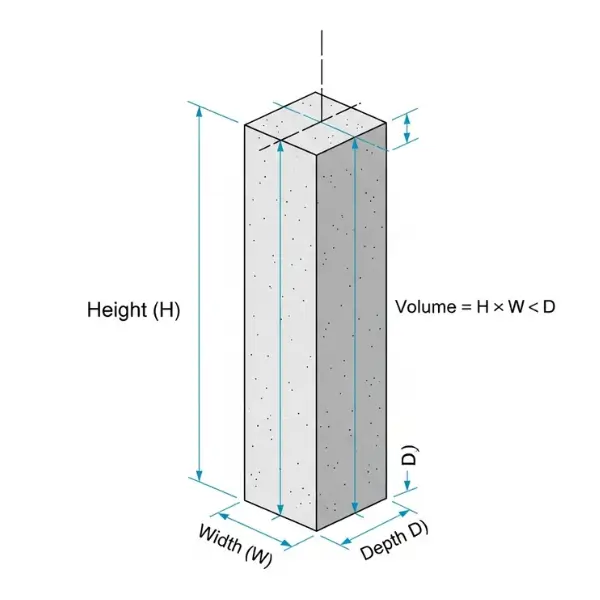Phone:
(701)814-6992
Physical address:
6296 Donnelly Plaza
Ratkeville, Bahamas.
Estimate the volume of concrete needed for round or square columns.
0 yd³
Cubic Feet
0 ft³
80lb Bags Needed
0
Your feedback helps us build better tools.
A Column Volume Calculator is a tool that helps you determine the amount of concrete needed for round or square/rectangular columns. By entering the dimensions of your column, it instantly calculates the total volume in cubic feet, cubic yards, and an estimate of how many pre-mixed bags you'll need.
Follow these simple steps for an accurate concrete estimate.
Measure the height and diameter (for round) or width and depth (for square) of your column.
For a square column, multiply Width x Depth. For a round column, use the formula π × radius².
Multiply the cross-sectional area by the column's height to get the volume in cubic feet.
Choose your column shape and enter its dimensions. Accuracy is key for a good estimate.
Press the "Calculate" button to process your dimensions and see the results instantly.
Receive a detailed breakdown of the concrete volume in cubic yards, cubic feet, and the number of bags needed.
These are the fundamental formulas our calculator uses to determine the volume of concrete needed for your columns.


Accurately calculating the volume of concrete needed is crucial for structural columns. Ordering too little can compromise the structural integrity of your project, while ordering too much leads to waste and unnecessary expense. This calculator ensures you get the right amount for a strong, cost-effective build.
Calculate Your Column VolumeSonotubes are cylindrical cardboard forms used to create round concrete columns for deck footings, support pillars, and other structures. You simply place the tube in the hole, pour in the concrete, and once it cures, the cardboard can be peeled away, leaving a smooth, round column.
This calculator bases the estimate on standard 80 lb. bags of concrete mix, which typically yield about 0.60 cubic feet of concrete. The number is rounded up to the nearest whole bag. Always check the yield printed on the specific brand of concrete bags you purchase, as it can vary slightly.
Yes, it's always a good idea to plan for about 5-10% extra concrete to account for uneven ground in your footing hole, spills, and to ensure your forms are completely full. It's much better to have a little left over than to run short.
The required depth of your footings depends on the frost line in your geographical area. The bottom of the footing must be below the frost line to prevent frost heave from moving your structure. Always check your local building codes for specific requirements in your area.
For any load-bearing columns, such as those supporting a deck or roof, reinforcement with steel rebar is almost always required by building codes. Rebar provides tensile strength, which concrete lacks, preventing the column from cracking under load. Check local codes for specific rebar size and placement requirements.
Cement is a key ingredient in concrete, but they are not the same thing. Concrete is a composite material made of three components: aggregate (like sand and gravel), cement, and water. The cement acts as a binding agent that hardens and holds the aggregates together to form concrete.
See why our calculator is a go-to tool for concrete projects.
Alistair Finch
Concrete Contractor
"I use this on every job site to confirm my numbers before ordering a truck. Hasn't been wrong yet. Essential tool."
Bronwyn Rhys
DIY Homeowner
"I used this for my back patio slab and it was a lifesaver. The bag estimate was perfect for my trip to the hardware store."
Cassian Valerius
General Contractor
"Quickly gives me the numbers my crew needs on site. Reduces errors and saves time. A must-have."
Elara Vance
Landscape Architect
"Great for planning out backyard patios and walkways for clients. Helps me quickly create a budget."
Peregrine Thorne
Property Manager
"I manage several rental units, and this calculator is essential for estimating flooring costs for turnover. Simple and very accurate."
Isolde Beaumont
Retail Store Owner
"Used this for budgeting the new flooring for my boutique. The estimate was incredibly close to my final cost."
Theron Petrov
Construction Manager
"Great for quickly estimating material needs for bidding on jobs. Simple, fast, and reliable."
Seraphina Dubois
Remodeler
"This calculator is so simple, but it saved me a couple hundred dollars by making sure I included a waste factor. Highly recommend."
Leander Croft
Handyman
"Does exactly what it says. Would be cool to see a feature that helps calculate costs for removing old flooring."
We'd love to hear from you! If you have suggestions, questions, or just want to say hello, please get in touch.